|
|
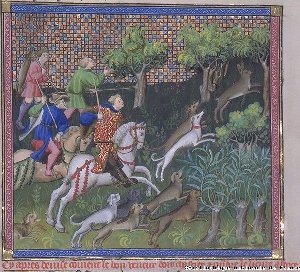 |
BASSET BLEU DE GASCOGNE & |
|
|
 |
At the present time, there are five different breeds of French Bassets with a well established standard :
The big French original hunting dogs were used in packs by horse-riders to chase stags, roe deer, wolves, wild boars and generally speaking large preys. Only the wealthy nobles were allowed to carry out this occupation. It was one of the most cherished entertainment of the kings, princes, and other knights of ancient time.
Opposite to what happened in England, where specialized breeds where selected and used for each game (staghound, foxhound, otterhound, harrier, etc.), the French hunting dogs were always intended to be used to chase all kinds of preys, except birds.
After the French revolution, hunting became a right for the ordinary citizens. But most people could not afford to hold a pack of large hunting dogs and horses.
On the other hand, the big hounds were much to fast for pedestrians. This led to the research and selection of smaller, slower dogs which would nevertheless possess the sense of smell and the pursuit ability of the well established breeds.
It is important to state that before the revolution, basset were already used in some areas with very dense bushes or forests. With their smaller size, they were able to follow the track of an animal much faster than the larger dogs.
All French hunting dogs have common antique ancestors :
The first real breed, with fixed standards, dates back
from the twelfth century. It was brought up by the abbots of the Saint
Hubert's Abbey, in Ardennes, and it is still called " Chien de Saint Hubert
" (known in England under the name of Bloodhound). Originally there were
two distinct varieties of Saint Hubert with different colors : one black
and red-brown, the other one white with large dark (gray-black to bluish)
spots. Today, the white variety is extinct.
The Saint Hubert (Bloodhound) is a large heavy dog, very
strongly built, with a fantastic " nose ". The father of all hunting dogs
!
During the second Crusade (1214-1270), Saint Louis King of France brought back large gray dogs from the Middle East, in all likelihood Tartar's greyhounds, and mixed them with the Saint Hubert to obtain a new very fast haunt dog, " le Chien Gris de Saint Louis "
Most of today's French breeds are a result of a crossing of these thirteenth century dogs, with typical local races resulting from natural selection.
Basset Artesien Normand : 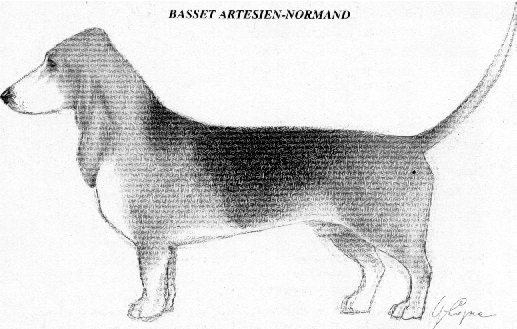
The actual standard dates back from the middle of the 19th century. It is the most common French basset.
It has a very long body, with short twisted legs, and a neck's height of 26 to 36 cm. Short hair and usually a three colors robe : white, brown orange, and black. The skin is wrinkled. Big dark eyes. Very long falling ears. Big nose, with large black nostrils. Long neck.
Excellent dog for all kind of games, from hare to wild boar.
The English Basset Hound is derived from the Basset Artesien Normand. It was first imported in England in 1866, and the First Club was founded in 1884. The race was modified with appropriate dosage of Bloodhound's blood, and a strict selection of the heaviest specimens.
Basset d'Artois :
Same as Basset Artesien Normand (above) but lighter and lower (26-32 cm at the neck). Shorter neck and ears. Can hunt in pack, but also a great dog when working alone, with an incredible nose.
Basset Bleu de Gascogne : 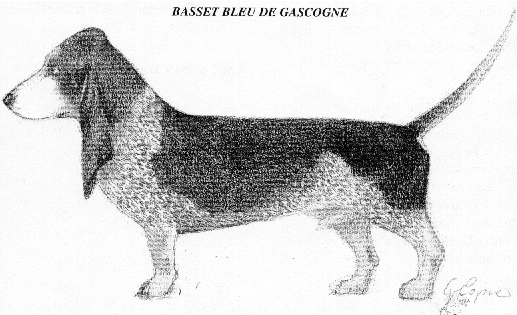
Very old race which appears on many antique pictures (14th
century) in the South West of France. Neck's height up to 42cm. Lighter
but more muscular than most other bassets. Average weight for a well fit
male 21-25kg (up to 53 pounds) approx. Very strong jaws with an ability
to kill the games (hunting). Can run quite fast, and for a long time. Big
dark eyes and long falling ears (longer than the nose!). Very big nose
and wide open black nostrils. Great scent dog for all games. Short hard
hair, mainly black-blue, gray, with blond-brown and white spots (feet,
over the eyes). Long tail which is held up (sabre).
At the present time the race is in danger of extinction.
Because of its specific qualities the Basset Bleu de Gascogne was mainly
used for pack hunting, and this activity is slowly disappearing, even in
France.
Basset Fauve de Bretagne : 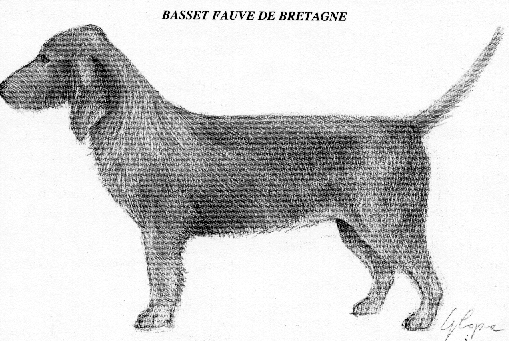
A long hair dog (Griffon) with multicolored robe. Short legs and neck's height between 32 and 36cm.
Very independent, Chase alone and is usually quite
fast. Typical Griffon's head.
Basset Griffon Vendeen :

Very similar to the former. Two varieties : short twisted
legs (neck's height 34-38 cm.), straight legs (necks height 38-42 cm.).
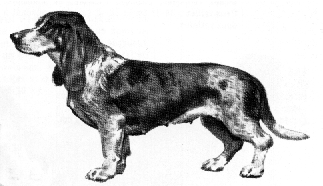 |
|